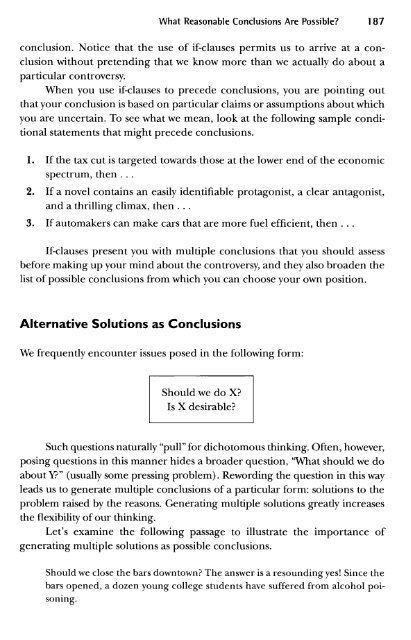Asking the Right Questions, A Guide to Critical Thinking, 8th Ed
Asking the Right Questions, A Guide to Critical Thinking, 8th Ed
Asking the Right Questions, A Guide to Critical Thinking, 8th Ed
Create successful ePaper yourself
Turn your PDF publications into a flip-book with our unique Google optimized e-Paper software.
What Reasonable Conclusions Are Possible? 187<br />
conclusion. Notice that <strong>the</strong> use of if-clauses permits us <strong>to</strong> arrive at a conclusion<br />
without pretending that we know more than we actually do about a<br />
particular controversy.<br />
When you use if-clauses <strong>to</strong> precede conclusions, you are pointing out<br />
that your conclusion is based on particular claims or assumptions about which<br />
you are uncertain. To see what we mean, look at <strong>the</strong> following sample conditional<br />
statements that might precede conclusions.<br />
1. If <strong>the</strong> tax cut is targeted <strong>to</strong>wards those at <strong>the</strong> lower end of <strong>the</strong> economic<br />
spectrum, <strong>the</strong>n . . .<br />
2. If a novel contains an easily identifiable protagonist, a clear antagonist,<br />
and a thrilling climax, <strong>the</strong>n . . .<br />
3. If au<strong>to</strong>makers can make cars that are more fuel efficient, <strong>the</strong>n . . .<br />
If-clauses present you with multiple conclusions that you should assess<br />
before making up your mind about <strong>the</strong> controversy, and <strong>the</strong>y also broaden <strong>the</strong><br />
list of possible conclusions from which you can choose your own position.<br />
Alternative Solutions as Conclusions<br />
We frequently encounter issues posed in <strong>the</strong> following form:<br />
Should we do X?<br />
Is X desirable?<br />
Such questions naturally "pull" for dicho<strong>to</strong>mous thinking. Often, however,<br />
posing questions in this manner hides a broader question, "What should we do<br />
about Y?" (usually some pressing problem). Rewording <strong>the</strong> question in this way<br />
leads us <strong>to</strong> generate multiple conclusions of a particular form: solutions <strong>to</strong> <strong>the</strong><br />
problem raised by <strong>the</strong> reasons. Generating multiple solutions greatly increases<br />
<strong>the</strong> flexibility of our thinking.<br />
Let's examine <strong>the</strong> following passage <strong>to</strong> illustrate <strong>the</strong> importance of<br />
generating multiple solutions as possible conclusions.<br />
Should we close <strong>the</strong> bars down<strong>to</strong>wn? The answer is a resounding yes! Since <strong>the</strong><br />
bars opened, a dozen young college students have suffered from alcohol poisoning.



